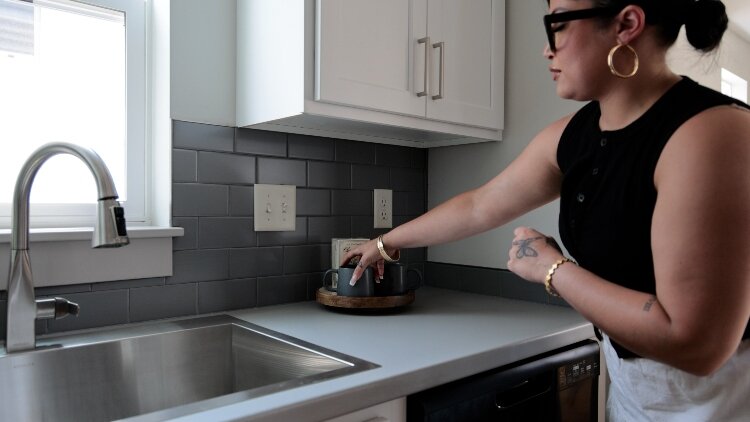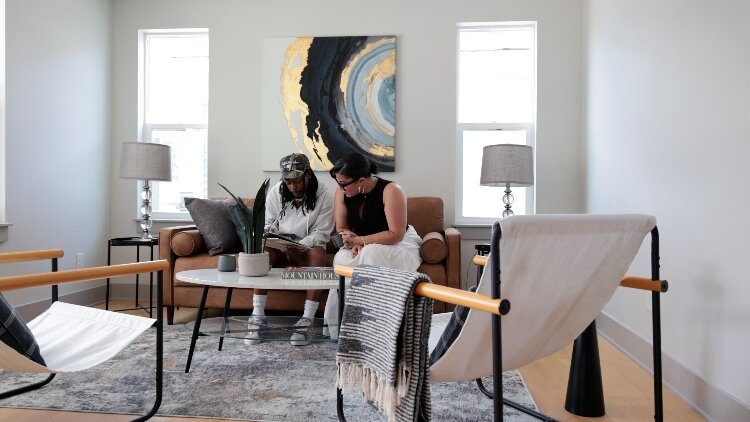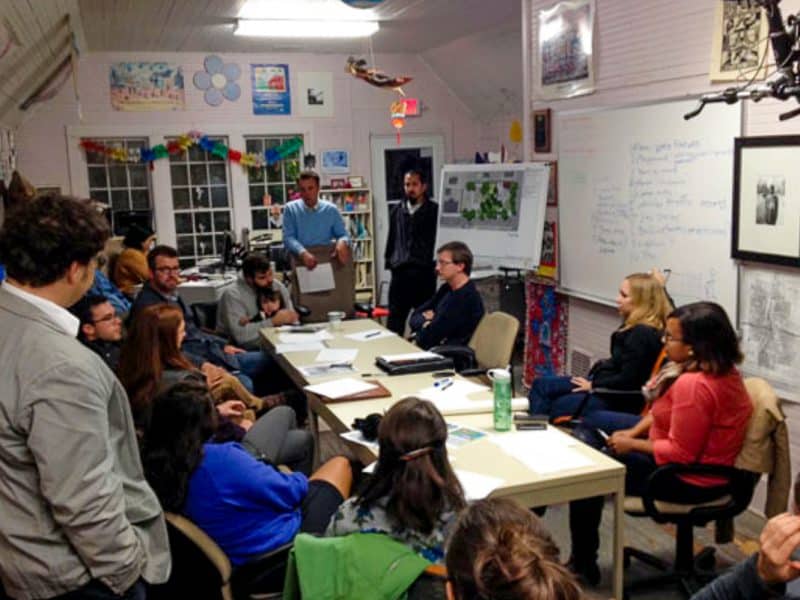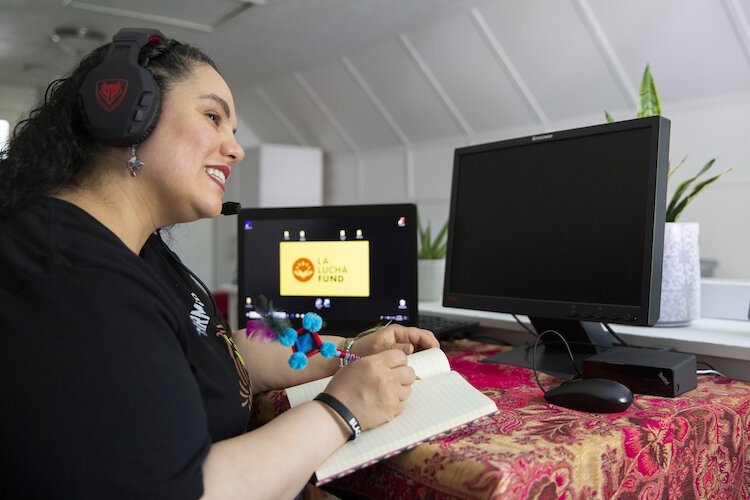Dwelling Place expands affordable homeownership through Community Land Trust
Dwelling Place’s Community Land Trust program creates lasting affordable homeownership opportunities across West Michigan for working families and single-income households.
For Keisha Schneider, owning a home after a divorce left her a single mother of three seemed like an impossible dream. But nearly a year after moving into her three-bedroom house built by Dwelling Place, she says the nonprofit’s Community Land Trust (CLT) program allowed her to put down roots.
“I purchased this house on my own. It’s a great program for middle-income people who otherwise would not be able to buy a home,” Schneider says. “I have to work hard to pay the mortgage. But I mean, if it weren’t for them, I would have never been able to purchase a house.”

A couple stands in the dining area of a staged CLT home at 2080 Union, highlighting the space.
Dwelling Place is among a growing number of nonprofits using the community land trust model to expand affordable homeownership. The organization is building homes in Grand Rapids, Holland, Grand Haven, and South Haven, tailoring developments to the needs of each community while centering long-term affordability.
“CLTs are part of a larger term called shared equity housing,” says Jacob Horner, chief real estate development officer at Dwelling Place. “The buyer has some equity, but the community also has equity through the CLT. The idea is that if we can share that equity — where the buyer gets some appreciation, but most of it goes to discount the price for the next buyer — we’re creating a perpetual inventory of homes that will always be affordable.”
Helping the ‘missing middle’
Horner says the goal is to prevent working-class families from being shut out of the housing market. Rising housing prices and interest rates have made homeownership increasingly inaccessible, especially for those in the so-called “missing middle” — people who earn too much to qualify for subsidies but not enough to compete in the open market.

A couple tidies up the bed in the primary bedroom of a staged CLT home at 2080 Union.
Dwelling Place’s CLT properties are priced significantly below market value. At the 2080 Union development in Grand Rapids, homes appraised at over $330,000 are being sold for around $240,000, Horner says. Eligible buyers can receive up to $100,000 in down payment assistance, potentially reducing the purchase price to as low as $150,000.
“You’re saving money every month that you own the house,” adds Scott Bodenberg, CLT manager at Dwelling Place. “You’re not waiting until you sell it to gain value. Personally, I’d rather save $600 a month and collect a little less at the end.”
Under the CLT model, buyers own their home and the land is leased from the trust, typically for 89 years. When a homeowner sells, they receive 25% of the appreciation plus any principal paid and approved improvements, while the rest stays with the trust to keep the next sale affordable.
The model isn’t new nationally. Bodenberg points to the first land trust, founded in 1969 in Georgia as a haven for Black farmers. But in Michigan, it’s gaining traction as home prices rise.

A couple relaxes on the couch reading in the living room of a staged CLT home at 2080 Union.
“We’ve got to do something, because it’s just unaffordable for your average home buyer,” Bodenberg says. “It’s a way to keep homes affordable forever.”
For Schneider, the structure of the CLT is not without tradeoffs. She acknowledges that while she may not recoup all of the investment she has made in home improvements, the stability outweighs the concerns.
“I was priced out of the rental market. I had to buy. It wasn’t really a choice, and luckily, this program came along and saved me,” Schneider says.
She says her three children enjoy having a home to call their own, even if the space is smaller than what they had in the past.
“It is small, but that’s OK. I think we need to normalize living in smaller homes,” she says.
Fitting into communities
Horner says Dwelling Place takes a targeted approach to development, prioritizing land donated or sold below market by cities, nonprofits, or religious organizations.
That strategy has enabled projects like the five new townhomes planned in Holland on land previously owned by Community Action House, and five to six homes in Grand Haven on a site purchased from the Salvation Army.
In South Haven, Dwelling Place plans to build a 50-unit apartment building alongside CLT townhomes or duplexes.
“A lot of communities have different needs,” Horner says. “We’re very proud that we can offer a mix — single-family homes, townhomes, and apartments.”
Each development aims to create inclusive communities, often incorporating shared green spaces and designs that foster neighborly interaction. At 2080 Union, homes are arranged to face each other with a common green space in the middle, maintained through a $25 monthly HOA fee.
Financing for the projects comes from a mix of sources, including MSHDA, local governments, and nonprofit lenders like IFF, which Horner says has been a key partner in Ottawa County.
Beyond construction, Dwelling Place provides homeowner education, social work support, and resident services.

A woman tidies the kitchen counter in a staged CLT home at 2080 Union.
“We try to work with our buyers as much as we can,” Horner says. “We want to keep them in the home as much as they want to stay.”
Schneider says she felt that support firsthand.
“They went above and beyond for me,” she says. “Construction was delayed, and I was supposed to be out of my place at a certain time. They worked with me to make sure me and my kids stayed housed. That was amazing.”
Dwelling Place has built 42 homes through the CLT so far, with more planned. Bodenberg says the model offers long-term value not just for individual families, but for entire communities.
“It’s almost like a community effort to keep affordable homes in a neighborhood,” Bodenberg says. “You benefit now, and others benefit after you.”
Schneider encourages others to explore the program.
“If they’re looking to buy and they’re having issues because of how expensive everything is, they need to contact Dwelling Place,” she says. “It’s a great program.”
Photos by Wayne Lewis from Carbon Stories for Dwelling Place.
This story series is made possible through the support of Dwelling Place, a nonprofit housing leader committed to building inclusive, resilient communities. Through this partnership, Rapid Growth Media explores how local solutions to housing, equitable access, and creative placemaking can shape broader national conversations from West Michigan.









